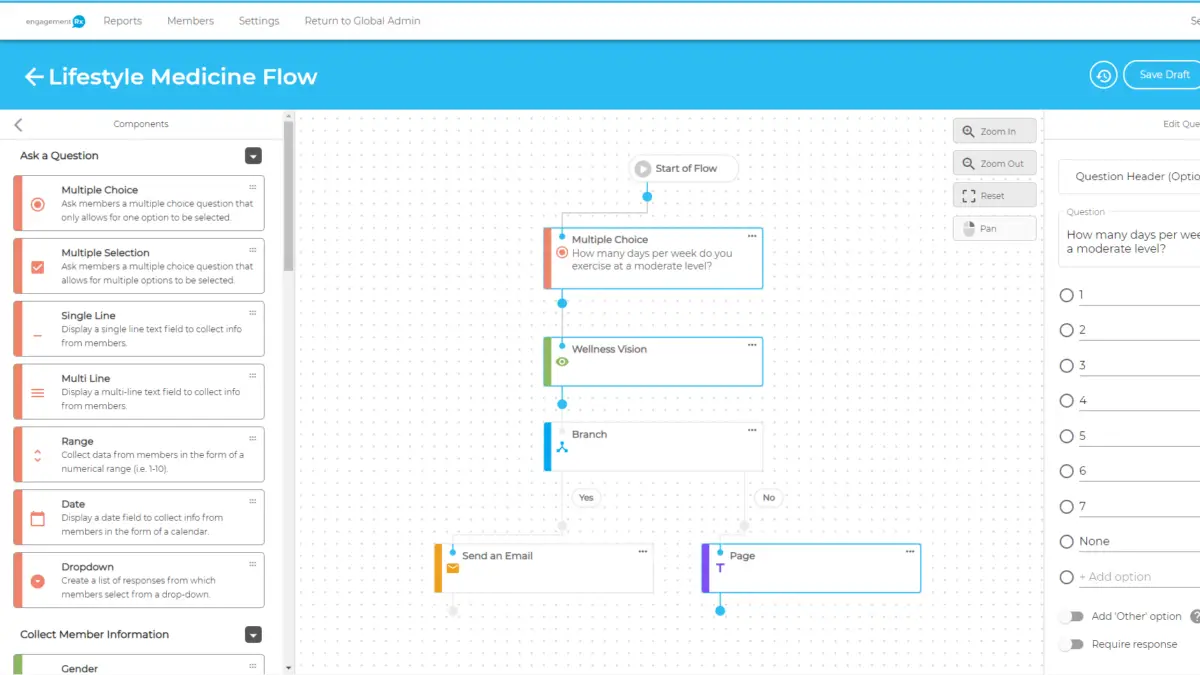The major determinants of good health lie outside of the healthcare system. Health and wellbeing are shaped by a wide array of influences like where we are born, live, work, learn and play. The Centers for Disease Control and Prevention identifies five social determinants of health that include: 1.) access to quality healthcare and 2.) education, 3.) social and community support, 4.) economic stability and 5.) the built environment.
At the center of improving outcomes for individuals and communities — are community centers that offer programs to address the health and well-being of local residents. With a plethora of programs and activities, it can be challenging for centers to educate members on all that’s available to them.
Here are three steps that can help community centers attract, engage, and keep community members on track with an effective community wellness program.
Step One: Provide motivating educational programs

Motivating educational programs are the cornerstone of sustained engagement in community wellness initiatives. Here’s how community centers can make their educational offerings more compelling and effective:
Personalization is Key
People are more likely to engage with content that feels tailored to their specific needs and interests. Personalized educational programs can address individual health goals, preferences, and schedules, making the experience more relevant and engaging.
How to Implement Personalization:
- Assess Member Needs: Use surveys or assessments to understand the health goals and interests of your community members.
- Tailored Content: Create content that caters to various demographics and health concerns. For example, offer different programs for young adults, seniors, and families.
- Flexible Learning Paths: Allow members to choose their own learning paths within the program, ensuring they can focus on what matters most to them.
Leveraging Digital Platforms
Digital platforms can significantly enhance the reach and effectiveness of educational programs. They provide a flexible and accessible way for members to learn at their own pace, anytime and anywhere.
Benefits of Digital Platforms:
- Accessibility: Members can access content from their homes or on the go, removing barriers related to time and location.
- Interactive Content: Incorporate videos, quizzes, and interactive modules to make learning more engaging.
- Progress Tracking: Use digital tools to track member progress and provide feedback, which can motivate continued participation.
Integration of Gamification
Gamification can make educational programs more engaging by introducing elements of play and competition. It taps into the natural human desire for achievement and recognition.
Gamification Strategies:
- Points and Rewards: Award points for completing courses, participating in activities, and achieving milestones. Offer rewards or recognition for high achievers.
- Challenges and Competitions: Organize challenges that encourage members to reach specific health goals. Friendly competition can boost motivation.
- Badges and Certificates: Provide digital badges or certificates for completing courses or programs. This not only serves as a motivator but also as a tangible achievement members can be proud of.
Expert-Led Sessions
Access to expert knowledge can greatly enhance the credibility and attractiveness of your educational programs. Consider including sessions led by health professionals, fitness experts, and wellness coaches.
Incorporating Expert Knowledge:
- Webinars and Workshops: Host live webinars and workshops where experts can provide insights, answer questions, and interact with members.
- Guest Articles and Videos: Invite experts to contribute articles or video content that can be included in your program.
- Q&A Sessions: Offer regular Q&A sessions with experts to provide personalized advice and support.
Community and Peer Support
Creating a sense of community within your educational programs can significantly boost engagement. Peer support and group activities can foster a supportive environment where members motivate each other.
Building Community:
- Discussion Forums: Create online forums or groups where members can discuss their progress, share tips, and support each other.
- Group Activities: Organize group activities or challenges that encourage members to work together towards common goals.
- Mentorship Programs: Pair new members with experienced ones who can provide guidance and encouragement.
Example of a Personalized Program
Healthy Living 101: A Personalized Approach to Wellness
- Week 1: Introduction to Wellness
- Assess personal health goals and create a customized plan.
- Educational videos on the basics of nutrition, exercise, and mental health.
- Week 2: Nutrition and Healthy Eating
- Interactive meal planning sessions.
- Personalized nutrition advice based on dietary preferences and health goals.
- Week 3: Exercise and Physical Activity
- Customizable workout plans.
- Virtual fitness classes and progress tracking.
- Week 4: Mental Health and Stress Management
- Techniques for managing stress and improving mental well-being.
- Meditation and mindfulness sessions.
By implementing these strategies, community centers can create motivating and engaging educational programs that keep members invested in their health and wellness journeys.
Step Two: Automate program reminders and support

Automation is a powerful tool for maintaining member engagement in community wellness programs. By automating reminders and support, community centers can ensure that members receive consistent encouragement and information, helping them stay on track with their health goals. Here’s how to leverage automation effectively:
Personalize Automated Communications
Personalized messages resonate more with members and show that the community center cares about their individual progress. Tailoring automated communications to each member’s needs and goals can significantly enhance engagement.
Strategies for Personalization:
- Member Profiles: Use member profiles to tailor messages based on individual health goals, preferences, and activity levels.
- Dynamic Content: Implement dynamic content in emails and messages that changes based on the member’s progress and interactions.
- Milestone Celebrations: Automatically recognize and celebrate milestones and achievements to keep members motivated.
Utilize a Multi-Channel Approach
Different members have different preferences for communication. Using multiple channels ensures that your messages reach members where they are most likely to see them.
Effective Channels for Automated Communication:
- Email: Send regular updates, reminders, and motivational messages via email.
- SMS/Text Messages: Use text messages for timely reminders and quick check-ins.
- Mobile Apps: If your community center has a mobile app, use push notifications to deliver reminders and support.
- Social Media: Leverage social media groups and direct messages for additional engagement.
Implement Automated Scheduling and Reminders
Automated scheduling and reminders can help members stay consistent with their wellness activities. This includes reminders for classes, appointments, and personal health tasks.
Automated Scheduling Tactics:
- Class and Event Reminders: Send automated reminders for upcoming classes, workshops, and events.
- Appointment Confirmations: Automatically confirm and remind members of their appointments with health coaches or wellness professionals.
- Task Reminders: Remind members to complete specific health tasks, such as drinking water, taking a walk, or logging their meals.
Provide Ongoing Support Through Automation
Automated messages can offer continuous support and encouragement, helping members overcome challenges and stay motivated.
Supportive Automation Features:
- Educational Content: Send regular educational content that aligns with members’ goals, such as tips on nutrition, exercise, and stress management.
- Progress Tracking: Provide automated updates on members’ progress, highlighting improvements and areas for further focus.
- Motivational Messages: Send motivational quotes, success stories, and words of encouragement to keep members inspired.
Integrate Feedback Loops
Automated systems can also gather feedback from members, helping community centers understand their needs and improve the program.
Gathering Feedback:
- Surveys and Polls: Automate the distribution of surveys and polls to gather member feedback on programs and services.
- Interactive Messages: Use interactive messages that allow members to provide quick feedback on their experiences.
- Data Analysis: Analyze the feedback collected to identify trends and areas for improvement.
Example of an Automated Support System
Engagement Rx: Automated Wellness Support
- Daily Health Tips: Personalized health tips delivered via email and SMS based on member goals.
- Weekly Progress Reports: Automated reports that track and highlight member progress, sent via email.
- Class and Event Reminders: Automated reminders for upcoming classes and events, delivered through email, SMS, and push notifications.
- Motivational Messages: Daily or weekly motivational messages to keep members inspired and engaged.
- Feedback Surveys: Monthly automated surveys to gather feedback and suggestions from members.
By leveraging automation for program reminders and support, community centers can maintain high levels of engagement and help members stay committed to their wellness journeys. Automation ensures that members receive timely, personalized, and consistent communication, which is key to achieving long-term health and wellness goals.
Step Three: Give them easy digital tools to use

Providing accessible and user-friendly digital tools is essential for engaging community members in wellness programs. These tools can enhance the overall experience by offering convenience, flexibility, and continuous support. Here’s how community centers can effectively implement digital tools to boost engagement:
Select the Right Digital Platforms
Choosing the right digital platforms is crucial for delivering a seamless experience. The platforms should be intuitive, easy to navigate, and cater to the specific needs of your members.
Key Considerations for Choosing Digital Platforms:
- User-Friendly Interface: Ensure the platform is easy to use, with clear navigation and minimal learning curve.
- Mobile Compatibility: The platform should be fully functional on mobile devices, allowing members to access it anytime, anywhere.
- Integration Capabilities: Choose platforms that can integrate with other tools and systems you already use, such as scheduling software and CRM systems.
Offer On-Demand Content and Courses
On-demand content allows members to engage with wellness programs at their own pace and convenience, increasing the likelihood of sustained participation.
Benefits of On-Demand Content:
- Flexibility: Members can access content whenever it suits them, making it easier to fit wellness activities into their busy schedules.
- Variety: Offer a wide range of content, including videos, articles, podcasts, and interactive courses to cater to different learning preferences.
- Microlearning: Break down content into small, manageable segments to prevent overwhelm and promote consistent engagement.
Facilitate Communication and Support
Digital tools should facilitate easy communication between members and community center staff, providing ongoing support and fostering a sense of community.
Effective Communication Strategies:
- Chat Functions: Implement chat features that allow members to ask questions and receive real-time support from staff.
- Forums and Groups: Create online forums or groups where members can share experiences, ask questions, and support each other.
- Virtual Meetings: Offer virtual meetings or consultations with wellness coaches and experts to provide personalized guidance.
Track Progress and Provide Feedback
Tracking progress is crucial for keeping members motivated and engaged. Digital tools should offer features that allow members to monitor their achievements and receive feedback.
Progress Tracking Features:
- Activity Logs: Enable members to log their activities, such as workouts, meals, and meditation sessions.
- Progress Reports: Provide automated progress reports that highlight achievements and suggest areas for improvement.
- Goal Setting: Allow members to set personal health goals and track their progress towards meeting them.
Ensure Data Privacy and Security
Members need to feel confident that their personal information is secure. Prioritize data privacy and security in your digital tools to build trust and encourage participation.
Data Security Measures:
- Secure Login: Implement secure login procedures, such as two-factor authentication, to protect member accounts.
- Data Encryption: Ensure all personal and health data is encrypted both in transit and at rest.
- Privacy Policies: Clearly communicate your privacy policies and practices to members, explaining how their data will be used and protected.
Example of a Comprehensive Digital Tool
Engagement Rx: A Holistic Digital Wellness Platform
- On-Demand Content: Offers a library of videos, articles, and courses covering various health topics.
- Interactive Features: Includes chat functions, forums, and virtual meeting capabilities for real-time support.
- Progress Tracking: Features activity logs, automated progress reports, and goal-setting tools.
- Mobile App: Fully functional mobile app for accessing content and tracking progress on the go.
- Data Security: Implements advanced security measures to protect member information and ensure privacy.
By providing easy-to-use digital tools, community centers can make wellness programs more accessible and engaging. These tools empower members to take control of their health journeys, providing the support and flexibility they need to achieve their wellness goals.
For more on how digital wellness offerings and automation can help community centers connect with members to improve their health and well-being, contact our team.













